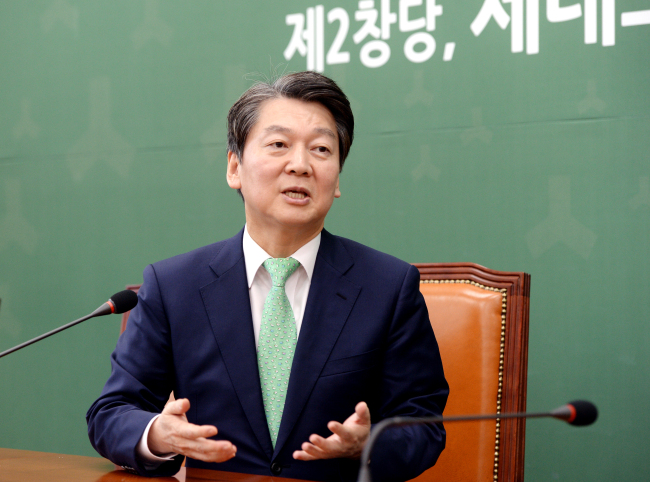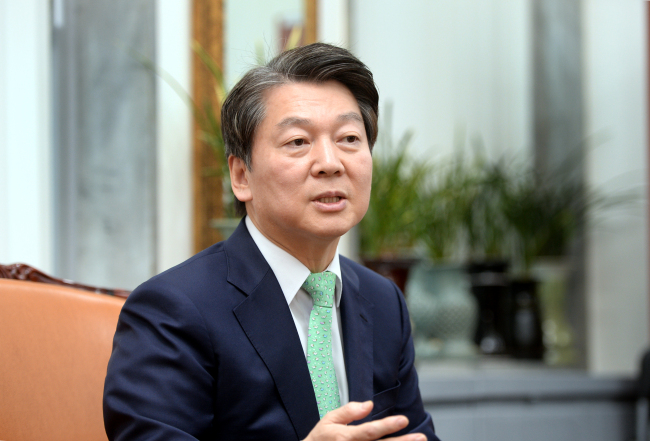The South Korean government must take on a firmer stance on North Korea, according to Ahn Cheol-soo, the chairman of the minor opposition People’s Party.
Ahn, who ran against President Moon Jae-in in the presidential election in May, also criticizes the Moon administration of “inaction” with regards to North Korea’s recent violation of the armistice agreement of the Korean War.

Ahn Cheol-soo, the chairman of the minor opposition People’s Party, speaks during an interview with The Korea Heraldon Thursday. (Park Hyun-koo / The Korea Herald)
In an interview with The Korea Herald on Thursday, the party leader said the government should lodge an official complaint to North Korea over the incident.
“The government should make an objection to the North and bring out some kind of a statement from the rogue state,” he said.
The violations of the armistice conditions occurred last week during a North Korean soldier’s daring escape to South Korea.
In the incident, North Korean soldiers were seen firing weapons across the Military Demarcation Line in the Joint Security Area in their pursuit of the defecting soldier. The MDL acts as the border between the two Koreas.
On the South Korean military’s handling of the situation -- not shooting back at the North -- he also said it should “adhere to principles” and “confront North Korea strongly.”
Citing the global trend of nations imposing stronger sanctions to pressure the North, he said it was time for the South Korean government to take a hard-line stance and to add to the international efforts to pressure. The United States recently relisted the rogue regime as a state sponsor of terrorism.
The party chief also stressed the importance of strengthening the alliance with the US, saying that is the way to make the North Korea talk to the South.
“North Korea is talking directly to the US and appears to be leaving us out of the discussions,” he said.
“We should maintain a strong relationship with the US to make sure the North do not get what it wants from our ally. And we should make sure that North Korea knows that,” he explained.
Building a good relationship with China should also be worked on, but the government should not walk on eggshells only to please the country.
“It is not too much to ask for an apology from China for its economic retaliation against the deployment of THAAD here, is it?” he said.

Ahn Cheol-soo, the chairman of the minor opposition People’s Party (Park Hyun-koo / The Korea Herald)
While calling for stronger stance toward the North for now, Ahn, as a supporter of the “Sunshine Policy,” said the ability to balance between tough and moderate measures was key to solving nuclear issues and relationship with North Korea.
The Sunshine Policy was the strategy of engagement and pursuing friendlier inter-Korean relations employed by late Presidents Kim Dae-jung. Late President Roh Moo-hyun, who took office immediately after Kim, for the large part maintained the policy, seeking to engage Pyongyang.
“Imposing stricter and stricter sanctions to demolish the regime is not the way either. No government has collapsed because they could not endure sanctions,” he said.
He had suggested the government to send anthelmintic to the North as part of a humanitarian aid, during a party meeting on Wednesday, as he believes humanitarian aids should be kept independent of political and diplomatic situations.
Ahn said the South should make efforts to gain trust from the North Korean people to prepare for a future when the two Koreas unite, and pointed to how they have greater trust for China.
During the interview, Ahn did not leave out his concerns for his party and reiterated that the People’s Party had been upfront about leading the multiparty scene at the National Assembly.
“The creation of the People’s Party is a miracle in itself, as the political sphere in South Korea had always been dominated by the ruling and the main opposition party,” he said.
The People’s Party was only established in February last year, two months before the general election. It won in 40 constituencies, most of them concentrated in the Honam region -- the Jeolla provides of the country’s southwest, which has long been the stronghold of the liberal bloc.
Saying that more citizens are supportive of the multiparty system, he credited his party of creating the diverse political landscape here.
“In a poll, I saw more than 60 percent of the people support the multiparty system. People are acknowledging the good in having a third party that keeps the two main political factions in check,” he said.
Comparing local politics to the duopoly that existed in flights to Jeju Island, before the introduction of budget carriers, Ahn said that the existence of more than two negotiation groups in the parliament promotes competition.
“When people see the two major parties, a governing one and its opposition, they think the two would fiercely compete with each other. But it turns out that they were not, and they were actually benefiting from each other’s existence,” he said.
The 55-year-old politician, who began his career as a medical doctor and founded the country’s largest antivirus software company, said that his life has been all about changes.
“What I spent the longest time doing is sales. People do not know this. I did not run the company (AhnLab) as a programmer,” Ahn said. “I have continuously worked to be effectively fit into the role I am in (at any given time), this has been true in being a doctor, CEO, professor, and politician.”
When asked whether he faces limits in pursuing changes in South Korean politics, he said the country’s electoral system is one of the biggest hindrances.
“The current single-member electorate system is the factor that is fostering the bipartisan system. We should change the election system to allow more political parties to have voices,” he said.
Ahn said he supported a system of larger constituencies with more than one representative, but that he was willing to accept and discuss different systems, such as party-list proportional representation, with other parties.
The party leader is currently pushing to establish a political alliance with the conservative opposition Bareun Party, as he sees it is important for the third faction to be strong against the two major parties.
While not all of the 40 members of his party agree with a merger, they unanimously consented on building a policy alliance with the Bareun Party.
For the multiparty system to be sustained, it is crucial that the two parties gather efforts to ensure competitiveness in the upcoming local elections in June.
“Now we talk about working together on policies, and I see that we should also further the discussion on building an alliance in the election,” he said.
It is right for them to become strong as a third faction and compete in a three-way race in the local elections, rather than the current four, he added.
In the latest poll by Realmeter on Thursday, the People’s Party stood last in the list of five main political parties with an approval rating of 4.4 percent among 1,515 respondents. The minor conservative Bareun Party, which has 11 parliamentary seats, stood at 5.6 percent, and the left-leaning Justice Party posted at 6.9 percent. The ruling Democratic Party of Korea garnered 51.8 percent to top the list and the main opposition Liberty Korea Party followed with 16.7 percent.
By Jo He-rim (herim@heraldcorp.com)






![[From the Scene] Monks, Buddhists hail return of remains of Buddhas](http://res.heraldm.com/phpwas/restmb_idxmake.php?idx=645&simg=/content/image/2024/04/19/20240419050617_0.jpg&u=20240419175937)
